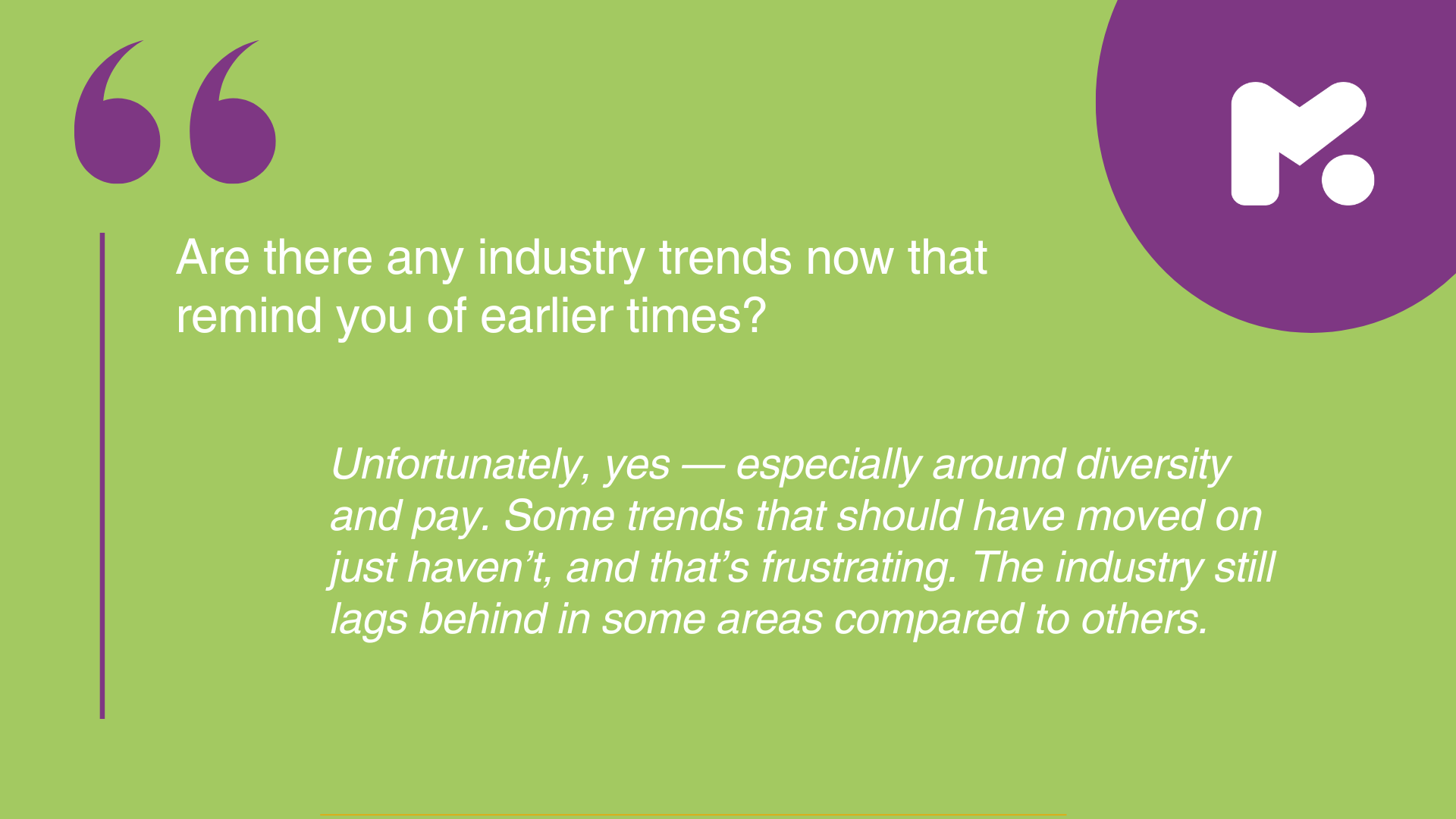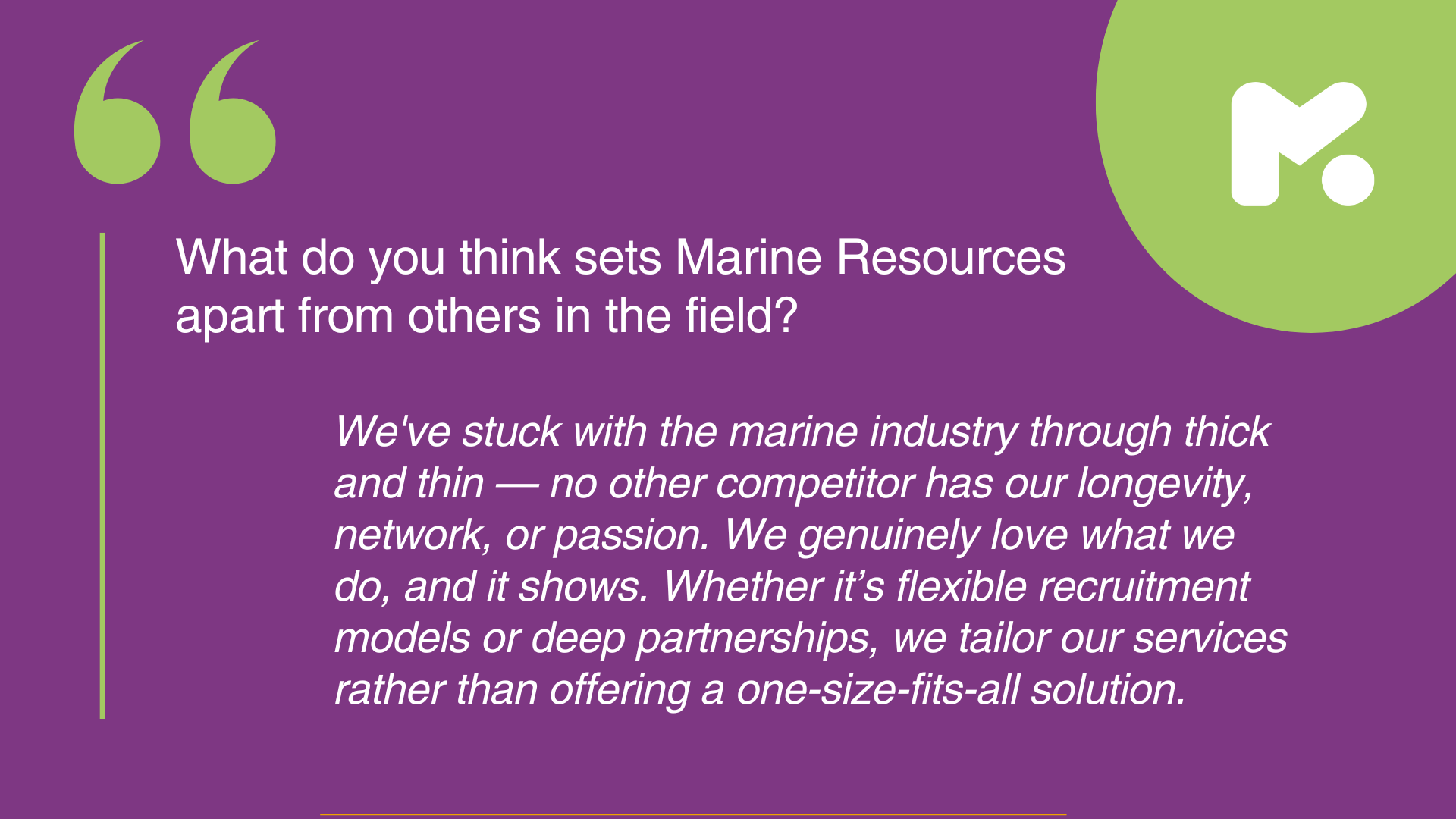
Marine Resources - As We Turn 22: Reflections, Shifts, and What Comes Next
Last month marked 22 years since Marine Resources began — a journey defined by deep specialism, long-term partnerships, and a genuine commitment to the marine industry we serve.
Over more than two decades, we've witnessed major shifts in technology, talent demands, and the evolving priorities of businesses across the marine sector. But through it all, our mission has remained clear: to stay rooted in what we do best — connecting exceptional people with outstanding opportunities — while continuously evolving to meet the needs of a changing industry.
From a 21-year-old boat builder with a bold vision, to the CEO of a sector-leading recruitment firm, James Ward’s journey with Marine Resources is one of passion, resilience, and tireless commitment to the marine industry. We sat down with James to reflect on the company’s 22-year evolution—from its early beginnings to what lies ahead.
The Journey So Far
What motivated you to start the business 22 years ago?
At the time, I was working as a boat builder — originally from Devon, but I'd ended up in the West Midlands, working on the outskirts of Birmingham. It was a great company, but I really wanted to move down to the Southampton area where I had lots of friends and spent time sailing, racing, and coaching. When I looked for boatbuilding jobs in the area, I didn’t really know where to look or who to speak to. I had some friends who were doing well in recruitment, so — being a cocky 21-year-old — I decided to move to Southampton and start a recruitment company focused on boat builders. That’s how Marine Resources was born: to support my lifestyle and passion for sailing.
How has your vision for MR changed — or stayed the same — over time?
It’s both changed and stayed the same. From the start, we’ve always wanted to remain highly specialist within the marine industry. While competitors have diversified into automotive or aerospace, we’ve stayed focused — and that’s helped build a strong, relevant network. But what has evolved is the understanding that marine isn’t as isolated as we once thought. We’ve helped clients bring in amazing people from other industries, showing that you don’t have to have a marine background to thrive here.
What were some of the pivotal moments or turning points in those early years?
Hiring my first team member was a huge milestone. Suddenly, you’re not just looking after your own workload — you're responsible for someone else's livelihood. Another big turning point was in 2007-2009 during the economic decline. We created an automated job board service that kept us afloat — clients could post jobs and pay online. That innovation helped us survive. Over the years, expanding from leisure marine into markets like superyacht and maritime has been critical too.
How has the industry evolved since you first started out?
Technology has transformed the industry — especially in recent years. It’s no longer just customer-facing roles; we’re seeing a big shift towards engineering and tech-driven jobs. The marine sector is far more advanced than people give it credit for.
What changes have had the biggest impact — whether good, bad, or unexpected?
COVID-19 was probably the biggest shock. We had to start again, essentially creating “Marine Resources 2.0.” But it also gave us a chance to reshape who we are. We came out of it a stronger, tighter team. Rebranding in 2019 was another major step. The original brand I created in my bedroom wasn’t cutting it anymore! We needed to show we could recruit at senior and professional levels, and the rebrand really helped position us properly.

You work across several sectors — how have these sectors changed over time?
We started in local leisure marine, working with boat builders and marine technicians — basically people I knew personally. But now, customer expectations have driven massive technological leaps. Superyacht clients, for example, are pushing innovation. Maritime is evolving too, especially with sustainability and green tech becoming priorities.
Are there any exciting developments or innovations in these industries that stand out to you right now?
Green maritime and Decarbonisation is really exciting — from wing sails on cargo ships to fully autonomous vessels. There’s real momentum behind innovation right now. I genuinely don’t think any other industry is pushing boundaries like this.
Which sector do you think is experiencing the most interesting transformation — and why?
Maritime is going through a huge transformation, especially around port electrification and green technologies. Even the leisure side is innovating — foiling is becoming more accessible, which is fantastic. The needs of a new generation of customers are pushing the whole sector forward.
What does being highly specialised in this one industry mean to you?
It means everything. I can't see myself not being part of a water-related industry. Being here for 22 years means we can talk with real insight. Clients and candidates trust us because we know the space, the people, and how it’s changed.
How has building a strong network helped shape the business over the years?
The marine industry has always been about who you know. Even with all the digital tools today, the personal side still matters. Our reputation is built on those long-standing connections. People who started with us as candidates are now clients — that says a lot.

Where do you see the biggest opportunities for growth or change?
Internally - we want to keep promoting what a great place we are to work. We’ve got a flexible, hybrid model and a great team culture. Externally - there’s massive potential in the tech and innovation spaces — especially around the green maritime activities.
What’s next for the business in terms of direction, offering, or focus?
We’re working on new offerings within our production, refit, and service team — including fixed-fee models and deeper partnership services. We’re also improving systems — with a new CRM, new website, and looking into using AI to boost efficiency so the team can focus on what they do best: working with people.
How are you and the team preparing for the next phase of the company’s evolution?
We’re doing a lot of internal work — analysing every candidate and client touchpoint. We always want to be the first to try something new, and the team is driving that energy. Everyone has a voice here, and we’re excited about what’s next.
What have you learned as a business leader in 22 years?
Hire people with the right attitude and ambition — the rest can be taught. And always check in with them. Understand what motivates them. If you have an engaged team, there’s very little you can’t achieve.
What are you most proud of when you look back?
Being recognised as a great employer. Creating a workplace where people are supported, can grow, and have a say is hugely important to me. I’m also proud of working with some of the biggest names in the industry. I also get a lot of pride in helping companies scale from small teams to real industry leaders.
If you could go back and tell your 2003 self one thing — what would it be?
Don’t wing it — have a plan! Get a mentor. Keep talking to people who’ve done it before. And most of all don’t ever ever doubt yourself.
James Ward’s journey is more than a success story — it’s a perfect example of the power of purpose, resilience, and passion for an industry. As Marine Resources looks to the future, one thing is certain: their commitment to the marine sector is as strong as ever.

